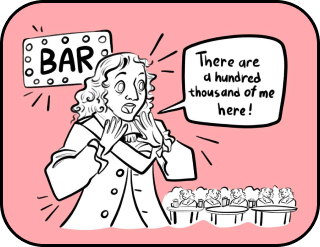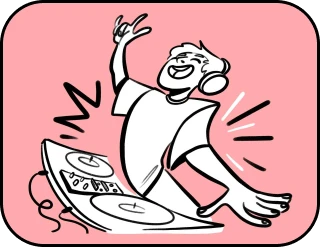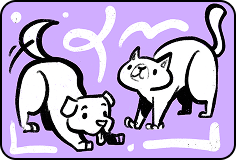Category: Materialization technologies
From Cave to Gym: Who Invented Competitions?
“Every morning in Africa, a gazelle wakes up. It must run faster than the lion or it will be killed. Every morning in Africa, a lion wakes up. It must outrun the slowest gazelle or it will starve. It doesn’t matter whether you’re a lion or a gazelle—when the sun comes up, you’d better be running”
Thomas Friedman,
The World is Flat: A Brief History of the Twenty-First Century
I’ve been running for hours. No cheers from the crowd, no whistle behind me, no fitness tracker. I’m not running to lose weight. I’m just running. First through the mud, then past trees and huge boulders. Birds scream above, and somewhere in the distance there’s a roar—either a beast or a hostile tribe.
The locals here don’t know the word “sport.” There’s only one rule: “If you don’t run—you don’t survive.” You can also try to throw a spear just right to hit an important target. Your dinner. But even after that—you’ll still have to run.
That’s it.
The first prehistoric competitions were games of survival, not played for medals or awards. The winner got meat. The loser got nothing. Primitive humans often tested their strength not for fun but to prove their role as the “alpha male” in the cave hierarchy. They hurled stones at each other, wrestled brutally without any rules to show: This cave is mine. This woman is with me. This mammoth is ours. I’m in charge.
It wasn’t a competition. It was life. Today, we might call that survival match, a CrossFit tournament—but back in those days, the winner got everything. That was all the motivation needed.
Portal to Ancient Egypt: The Body as a Divine Vessel
Hot sand burns beneath my feet. The air is so hot it feels like it’s melting. Before me stands a majestic temple, adorned with carved columns and colorful frescoes depicting Egyptian gods.
Between the columns, two strong men are wrestling. I see their shaved heads and tense backs. Their fight looks more like a noble dance, each movement precise and intentional.
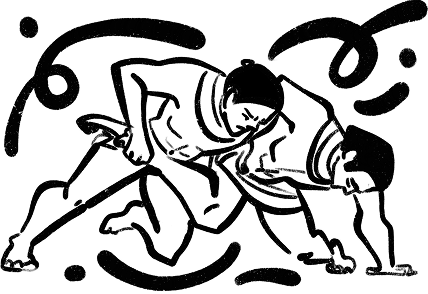
“We’re not fighting,” says one of the wrestlers without turning. “We are preparing ourselves. The gods do not accept weak mortals. It’s disrespectful. The body is our temple. Every day we clean it, sharpen it, strengthen it.”
I stand and watch as their wrestling turns into meditation. No one here would dream of building muscles just for the beach. For the people of Ancient Egypt, muscles were a way to get closer to the heavens—to become part of the divine world.
And sport here? It’s not for show. It’s preparation for eternity—where you purify yourself, become a better version of who you are.
And only when your body is truly ready, then you may begin to pray.
Want to be closer to the gods? Then move. I look at the flushed faces of the wrestlers and think: They don’t have sneakers. No protein powder. No smartwatches tracking calories.
But their bodies are like sculpture. And their minds—still as calm water.
Portal to Ancient Greece: Preparing for Competition
The sun is blazing, marble columns rise around me, and a dusty track lies beneath my feet. I’m standing at the entrance of the gymnasion. And everyone around me is naked—because that’s how it is here. In Ancient Greece, the body is not something to be hidden: it’s admired, trained, sculpted like a marble statue.
The gymnasion in Ancient Greece is a school for both the body and the mind. Here, they run, throw discs, wrestle, study philosophy, debate the nature of virtue, and learn music, poetry, and mathematics. The Greeks believed: to be a complete human being, one must have trained muscles and a clear mind. Strong arms attached to a weak mind meant nothing.
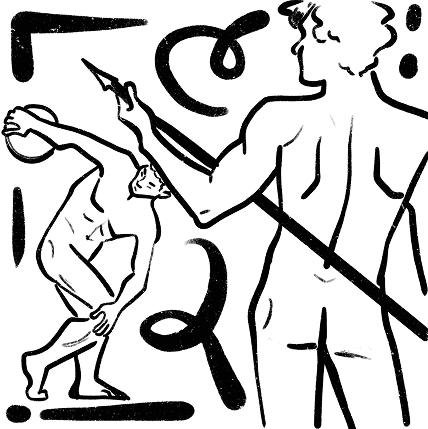
I feel awkward, shy. The young Greek men around me look like living sculptures—bronzed, groomed, lean like olives.
“Are you ready to agonize?” one of them asks me.
“What?” I ask, swallowing my curiosity.
“To agonize—to compete. To challenge yourself. To wrestle with your own limits.”
Agon is the ancient Greek cult of competition. Through it, they developed character, willpower, and inner harmony.
“Do you want to become a kalokagathos?” the youth in a man’s chiton presses further.
“A what?” I still don’t understand.
“A kalokagathos—an ideal citizen: beautiful, intelligent, virtuous. If you want that, then come with me. I’ll prepare you for the Olympics.”
The Olympic breakfast consists of fruit, cheese, and unleavened bread.
The heat is unbearable, the stones burn your heels—but in the gymnasion, everything runs on schedule: becoming a worthy person is possible only through patience. Shouts, dust, heavy breathing.
Before training, our bodies are rubbed with oil to make them supple, then covered with sand to keep from slipping out of the wrestling ring. When the sun begins to slide behind the columns, running begins. And right after that—a dance. No words. Only movement. Training ends only when you’ve found harmony.
I try to train, to do everything they say. It’s hard. Very hard.
But slowly, I get used to the intensity, and after a while, I notice that my body begins to move as lightly as thought. Not with the goal of getting in shape for summer—but with the goal of becoming a new, stronger version of myself.
“Come on—5 more kilometers for Zeus. And 5 more for Athena. Soon, you’ll be competing in the Olympics.”
“In what sport?”
“In all of them.”
Heading to the Olympics
I’m not a pro or a hero. Not the son of a god. Just an ordinary person who made it to the Olympics with dusty feet and ragged breath.
Around Olympia there’s a buzz—crowds of pilgrims, athletes, priests. Some are praying, some rubbing oil on their bodies, others practicing wrestling techniques.
I feel lost. Too many bodies. Too many expectations. And no certainty.
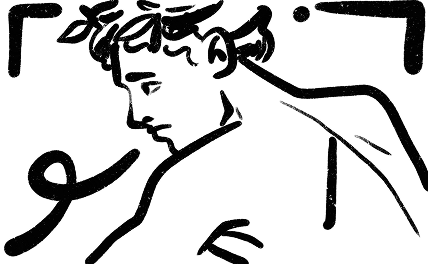
The first competition – Running
A huge stadium, around 180 meters. We’ll run barefoot on scorching sand. Speed isn’t my strong suit. But I will run anyway. Because the most important thing—is not to lose the battle against myself.
Second Competition – Wrestling
Here, no one bluffs. There are no staged arguments between opponents to excite the crowd. The goal is simple: throw your opponent to the ground three times.
Third Competition – Discus Throw
A stone disc held out on an extended arm. You can even flex your muscles a little. You have to throw the discus with style, with beauty—and as far as you can.
Fourth Competition – Long Jump
Yes, with weights in your hands. You must imagine that these heavy stone weights are wings. It’s hard. Unnatural. They pull my arms toward the ground—but still, I soar, even if just for a moment.
Fifth Competition – Javelin Throw
Now this one is mine. Throwing a javelin feels like hunting in the prehistoric era. You must launch it far and true—enough to take down a mammoth.
I release the javelin. It lands dead center on the target—the best result. The victory wreath is mine. And it felt real.
Sixth Competition – Pankration
A mix of wrestling and bare-knuckle boxing. Ruthless, dynamic matches with almost no rules. The first ММА.
My body aches. Dust is ground into my skin, as if I’ve become part of the earth itself. But inside—silence. Not fatigue. Not emptiness. Calmness—one I’ve never known before.
The very silence the priests in Egypt once spoke of. The silence I ran for, jumped for, wrestled, fell, and rose again for.
I didn’t come here for the victory wreath, or the spectators, or even for Zeus. I came here as someone else—but now I leave as my true self. The Olympics aren’t about medals. They’re about who you become when it’s all over: a better version of yourself—stronger, more resilient.
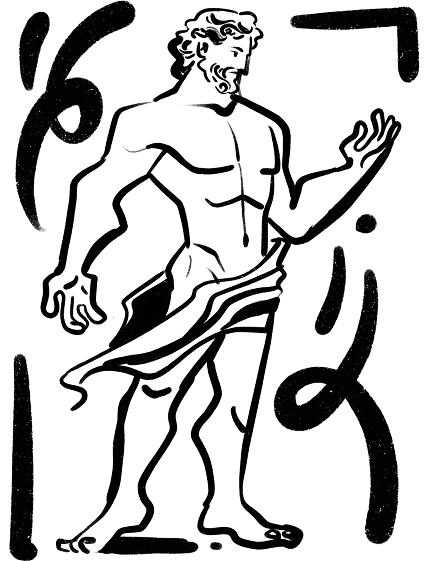
Returning to Reality
At last, I’m home—in my familiar modern world. I’ve been through a lot, traveling across time. It was hard, but I made it.
Now I’ve got everything to feel like a real athlete: a fitness tracker, smart sneakers, an app that guilt-trips me if I move slower than the old man in the park. On my wall hangs a poster that says, “No pain — no gain.” My headphones blast a motivational track: “Pump that bicep, bro.” I’ve run 350 meters—time to post a story so my friends can hit “like.”
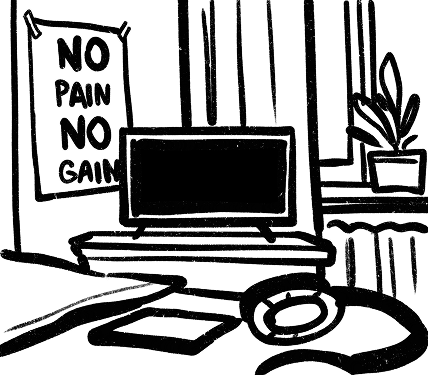
I get home and turn on the TV. The Olympics are on. Lasers flash across the stadium, replaced by drone shows.. Instead of professional dancers, TikTokers perform. Then come the athletes—strutting proudly in neon suits covered in sponsor logos.
Coaches no longer encourage. They shout: “Your contract’s waiting!” The gold medal is awarded by a YouTuber who once ate 150 hamburgers in an hour.
The commentator rambles, “Our sponsor is Coca-Cola. Coca-Cola is better than water. Look at the athletes—they all drink Coca-Cola.”
I walk over to my shelf of gadgets, toss all the fitness trackers in the trash, step outside, and just start running. Not for likes. Not for someone else’s eyes. But for who I am—and who I can become.
From the pocket of my tracksuit, I pull out a crumpled page—cut from a 1970s magazine. On it, a photo of athletes from the XX Summer Olympic Games in Munich. And beneath it, the words:
“Start where you are. Use what you have. Do what you can”
Arthur Ashe, American tennis player
Our articles are an elixir of wisdom for your mind. Approved by alchemists.
Thank you!


